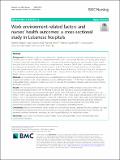Work environment-related factors and nurses’ health outcomes : a cross-sectional study in Lebanese hospitals
Abstract
Background Worldwide, studies show a relationship between nurses’ health and some work environment factors; however, data on nurses’ health and self-perceived workload and nursing task allocation are lacking, particularly for Lebanese nurses. We assessed the relationship of several work environment factors: overall workload and specific temporal, physical, mental, effort, frustration, and performance demands (NASA Task Load Index), staffing resources and adequacy and leadership (Practice Environment Scale of Nursing Work Index), teamwork climate (Safety Attitudes Questionnaire), and nursing task allocation (Basel Extent of Rationing of Nursing Care)) with self-reported musculoskeletal, cardiovascular, skin, and mental health diseases (Work Ability Index) and emotional exhaustion (Maslach Burnout Inventory) among Lebanese nurses. Methods A cross-sectional self-report survey was distributed to all 289 registered nurses (RNs) in the medical, surgical, and pediatric units in two Lebanese university-affiliated hospitals; 170 RNs had complete data. Adjusted multivariable logistic regression models were used to estimate the association between work environment factors and health outcomes. Results The most prevalent outcomes were musculoskeletal disease (69%), emotional exhaustion (59%), and mental health problems (56%); 70% of RNs had ≥2 and 35.29% had ≥4 co-occurring health problems. Musculoskeletal disease was associated with higher overall (OR = 1.36 (95%CI = 1.03, 1.80)), temporal (OR = 1.30 (95%CI = 1.09, 1.55)), and physical demands (OR = 1.20 (95%CI = 1.03, 1.49)), higher task allocation to RNs (OR = 1.11 (95%CI = 1.01, 1.23)) and lower teamwork climate (OR = 0.60 (95%CI = 0.36, 0.98). Higher odds of mental/emotional problems were associated with higher overall, temporal, frustration, and effort demands, and lower teamwork climate, performance satisfaction, and resources adequacy (increased odds ranging from 18 to 88%). Work environment indicators were associated with higher co-occurrence of health problems. Conclusions Results show elevated health burden and co-morbidity among Lebanese RNs and highlight the value of comprehensive approaches that can simultaneously improve several work environment factors (namely self-perceived workload, teamwork,, resources, and nursing task allocation) to reduce this burden.
Citation
Elbejjani , M , Abed Al Ahad , M , Simon , M , Ausserhofer , D , Dumit , N , Abu-Saad Huijer , H & Dhaini , S R 2020 , ' Work environment-related factors and nurses’ health outcomes : a cross-sectional study in Lebanese hospitals ' , BMC Nursing , vol. 19 , 95 . https://doi.org/10.1186/s12912-020-00485-z
Publication
BMC Nursing
Status
Peer reviewed
ISSN
1472-6955Type
Journal article
Description
The proposed study was funded for 2 years (2018–2020) by the Medical Practice Plan funding award, Faculty of Medicine, American University of Beirut, Lebanon.Collections
Items in the St Andrews Research Repository are protected by copyright, with all rights reserved, unless otherwise indicated.
Related items
Showing items related by title, author, creator and subject.
-
Effect of free medicine distribution on health care costs in Canada over 3 years : a secondary analysis of the CLEAN meds randomized clinical trial
Persaud, Nav; Bedard, Michael; Boozary, Andrew; Glazier, Richard H; Gomes, Tara; Hwang, Stephen W; Jüni, Peter; Law, Michael R; Mamdani, Muhammad; Manns, Braden; Martin, Danielle; Morgan, Steven G; Oh, Paul; Pinto, Andrew D; Shah, Baiju R; Sullivan, Frank; Umali, Norman; Thorpe, Kevin E; Tu, Karen; Wu, Fangyun; Laupacis, Andreas; CLEAN Meds study team (2023-05-26) - Journal articleIMPORTANCE : Few interventions are proven to reduce total health care costs, and addressing cost-related nonadherence has the potential to do so. OBJECTIVE : To determine the effect of eliminating out-of-pocket medication ... -
Pädiatrische versorgungskonzepte in Europa
Weber, Martin W; Backhaus, Sophia; Chukwujama, Obiora; Fenski, Friederike; Henking, Christoph; Schatte, Laura; Aleman-Diaz, Aixa Y (2018-01-19) - Journal articleTo promote children’s health in Europe, the World Health Organization (WHO) developed the European child and adolescent health strategy 2015–2020, which is supported and will be implemented by all Member States (MS). In ... -
Arts-based approaches to promoting health in sub-Saharan Africa : a scoping review
Bunn, Christopher; Kalinga, Chisomo; Mtema, Otiyela; Abdulla, Sharifa; DIllip, Angel; Lwanda, John; Mtenga, Sally M.; Sharp, Jo; Strachan, Zoë; Gray, Cindy M. (2020-05-21) - Journal itemIntroduction Arts-based approaches to health promotion have been used widely across sub-Saharan Africa (SSA), particularly in public health responses to HIV/AIDS. Such approaches draw on deep-rooted historical traditions ...

